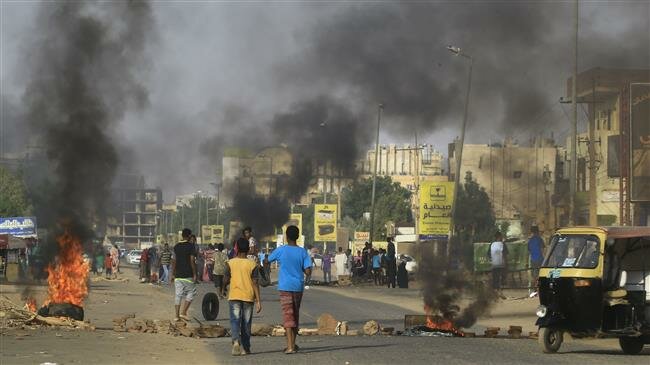(ABNA24.com) According to a doctors committee linked to the opposition, the victims “succumbed to direct wounds from sniper bullets during a peaceful rally in al-Obeid”, the capital of central province of North Kurdufan, on Monday.
The committee added that several others also sustained wounds at the rally without giving further details.
Separately, the Sudanese Professionals Association (SPA), a key protest group, said in a statement that the school students held the rally and confirmed that “live ammunition” was used against them.
“We are calling on all citizens and medics to go to the emergency ward of al-Obeid hospital and other hospitals that are receiving the wounded from the live ammunition fired on the rally of school students,” the SPA said on its Facebook page.
There was no immediate statement from the state security services, or from Sudan's military leaders who ousted former president, Omar al-Bashir, through a coup in April as the protests mounted.
Videos circulating on social media purported to show pupils protesting outside El-Obeid's main hospital against the killings and injuries, Reuters said.
The African country has been the scene of numerous protest rallies over the past seven months. On April 11, the Sudanese military unseated and then imprisoned 75-year-old Bashir after some four months of widespread protests over dire economic conditions and soaring prices of basic commodities.
Following the ouster of Bashir, who had come to power through a military coup in 1989, Sudanese military leaders established the so-called Transitional Military Council (TMC) with the task of running state affairs.
However, generals of the TMC also moved to consolidate power and faced popular protests, which called for a civilian body to govern the country.
The protest rallies against the military leaders have on many occasions turned bloody in the face of a heavy-handed crackdown.
In the most violent case of the clampdown, gunmen in military fatigues raided the site of a weeks-long sit-in outside Sudan’s army headquarters in capital Khartoum on June 3, leaving hundreds dead or wounded.
Last week, the findings of an investigation, conducted by prosecutors and the TMC, into the massacre showed that 87 people had were killed in the violence, a death toll much higher than the Sudanese Health Ministry's previous estimate of 61.
The officials number of death is a far cry from unconfirmed numbers released by opposition medics, who claim at least 127 people were killed and 400 sustained injuries after security forces fired live ammunition at protesters.
The investigation blamed the bloody dispersal on “rogue” military personnel.
On Sunday, hundreds of people flocked to the streets in the capital, protesting the results of the probe.
The TMC and an alliance of opposition groups are working with Ethiopia and the African Union to finalize a power-sharing deal for peaceful transition to a civilian rule, but the process has repeatedly stalled.
Under the power-sharing agreement negotiated earlier this month between the two sides, an 11-member body will govern the country for just over three years.
The governing council consists of five military members, five civilian ones, and an 11th civilian chosen by both sides. A military general will head the council for the first 21 months, and then a civilian leader will replace the military one for another 18 months.
Negotiations on other aspects of the transition are still continuing. On Tuesday, the two sides are due to meet to settle the remaining issues regarding the forming of a civilian administration.
Egypt and the oil-rich Persian Gulf states, particularly Saudi Arabia and the United Arab Emirates (UAE), perceive Sudan as a strategically important country in the region. They have boosted their political and financial involvement in the African country since Bashir’s ouster.
Additionally on Monday, General Mohamed Hamdan Dagalo, the deputy leader of the TMC and the second most powerful man in Sudan right now, met with Egyptian President Abdel Fattah al-Sisi in Cairo.
The opposition regards Dagalo’s feared paramilitary RSF as the prime suspect on June 3 massacre.
A night-time curfew was also imposed on Monday in four towns in Sudan's North Kurdufan state, including its capital Al-Obeid, after five protesters were shot dead at a rally, authorities said.
The curfew will be effective from 9:00 pm (1900 GMT) to 6:00 am for an indefinite period, the office of North Kurdufan's governor said in a statement.
In a related development, Sudan's main protest group demanded the ruling military council immediately agree to a final transition deal after at least five people were killed in the city of El-Obeid.
The Sudanese Professionals' Association issued a statement, calling for nationwide protests in response to the killings in El-Obeid.
/129

